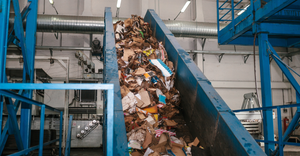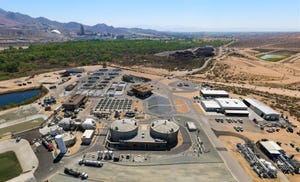One of the World’s First Zero-Waste Kitchens is in Millvale, Pa.
November 19, 2021

Pittsburgh— In a recent episode of the Food Network competition “Chopped,” contestants were challenged to make a dish using a basket of ingredients that included bacon, mangoes and banana bread. Imagine the same challenge, except that the basket has been replaced by 100 pounds of each ingredient.
This was the problem confronting 412 Food Rescue a few years ago. The nonprofit had connected with hundreds of local businesses, discovering hundreds of pounds of good surplus food available for donation every day, but there was no kitchen in the region that could accommodate that deluge. In 2019, the organization came up with a solution by opening its own kitchen, the Good Food Project. Operating with zero food cost and zero waste, the kitchen is a model for effective food recovery and distribution.
Food waste makes up about 25% of all material in landfills, more than any other single source of waste, and is a leading cause of greenhouse gas emissions. In the U.S., 35% of all food that is produced is wasted, while 10.5% of households are food-insecure.
The Good Food Project prevents waste at the retail level by transforming good-quality surplus food into healthy, heat-and-eat meals and shelf-stable items packaged in compostable containers. These meals are then distributed to nonprofit partners that serve people facing food insecurity. Head chef and project manager Greg Austin emphasizes nutrition and dignity in his balanced meals, which each include a main dish, side dish and dessert. An example of a recent meal: chicken chili, spinach dip and pita chips, and rice pudding.
The donations come from partners like Gordon Food Service, which may find themselves with food that is still perfectly good to eat but cannot be sold due to aesthetic standards, sell-by timelines, or transit mishaps. Austin and his team come up with creative ways to turn these unpredictable donations into satisfying dishes. “I’m super grateful for the opportunity to do this work and looking forward to growing this project’s impact as a team,” says Austin.
In the beginning, the project created 300 meals per month at zero food cost. It has served 22 non-profit partners, produced well over 17,000 meals, and is currently creating upwards of 600 meals per week, still at zero food cost. An expansion funded by Eden Hall Foundation and completed in June 2021 has outfitted the project with double its original prep space, a walk-in cooler and freezer, and additional capital investment. With these tools, the kitchen aims to produce 100,000 meals per year at full scale. Additionally, a new program will distribute over 500 grocery bags of food per week to Allegheny County Housing Authority locations.
While the kitchen has been expanding its reach, it has also been reducing its waste – all the way to zero. The project stabilizes and uses every ounce of food that it can, and the remainder is composted through Pittsburgh-based Zero Waste Wrangler, which picks up compost onsite and delivers it to AgRecycle. No food goes to landfills. The project’s building is also solar-powered to help offset energy use.
The Good Food Project has achieved its zero-waste status through the help of tools like Leanpath, a tracking and measurement-focused technology solution that compiles and analyzes data to illuminate an operation’s food waste stream. While Leanpath works with thousands of kitchens around the world, the Good Food Project application is trend-setting as it starts out with surplus food, using ingredients that would otherwise have gone to waste.
“We are thrilled to partner with 412 Food Rescue through our Leanpath 12.3 Initiative, helping to accelerate their innovative work to address hunger head-on while preventing perfectly good food from going to waste,” said Leanpath’s Steven Finn. “Our partnership is a perfect blend of mission, innovation and action to help people and the planet. Using our tracking technology, the 412 Food Rescue team gains continual actionable insights into its waste data -- both upon receipt and through meal preparation -- to improve the efficiency of operations and maximize the utility of existing food resources.”
The Good Food Project will hold a grand reopening event that will be open to the public at its headquarters at 112 E. Sherman St., Millvale, for funders, donors, partners and community members on December 6, 2021 from 5-7 p.m., with a VIP hour by invitation only beginning at 4 p.m. The event will include tours of the space, a brand re-launch and food prepared by Chef Greg Austin that highlights the possibilities of cooking delicious, healthy meals with surplus food. Media are invited to attend a presentation about the program at 5:30 p.m. and can RSVP to Liz Fetchin at 724/612-9921 or [email protected].
Here’s a link to photos for your use.
###
About 412 Food Rescue: Driven by the belief that good food belongs to people, not landfills, 412 Food Rescue launched in Pittsburgh, PA in March 2015 to redirect healthy food from the waste stream to households and nonprofits that serve people experiencing food insecurity. In the United States, as much as 40 percent of food produced is wasted while 1 in 5 people go hungry. The only organization in the Greater Pittsburgh Region focused on food that would otherwise be discarded, 412 Food Rescue addresses both hunger and food waste by mobilizing volunteers to bring surplus food from retail locations to nonprofits serving people in need. The growing team of 13,000+ volunteer drivers, mobilized by the Food Rescue Hero® technology platform, has redirected more than 19 million pounds of food in western Pennsylvania, equating to 16 million meals and mitigating 10 million pounds of CO2 emissions in the process. Locally, the organization works with 800 food retailers and 600 nonprofit partners.
About Leanpath: Leanpath is a mission-driven technology company making food waste prevention and measurement everyday practice in the world’s kitchens. Since 2014 alone, working in thousands of kitchens globally, Leanpath has prevented over 70 million pounds of food from being wasted. Offices are located in the U.S., U.K., and China.
You May Also Like


